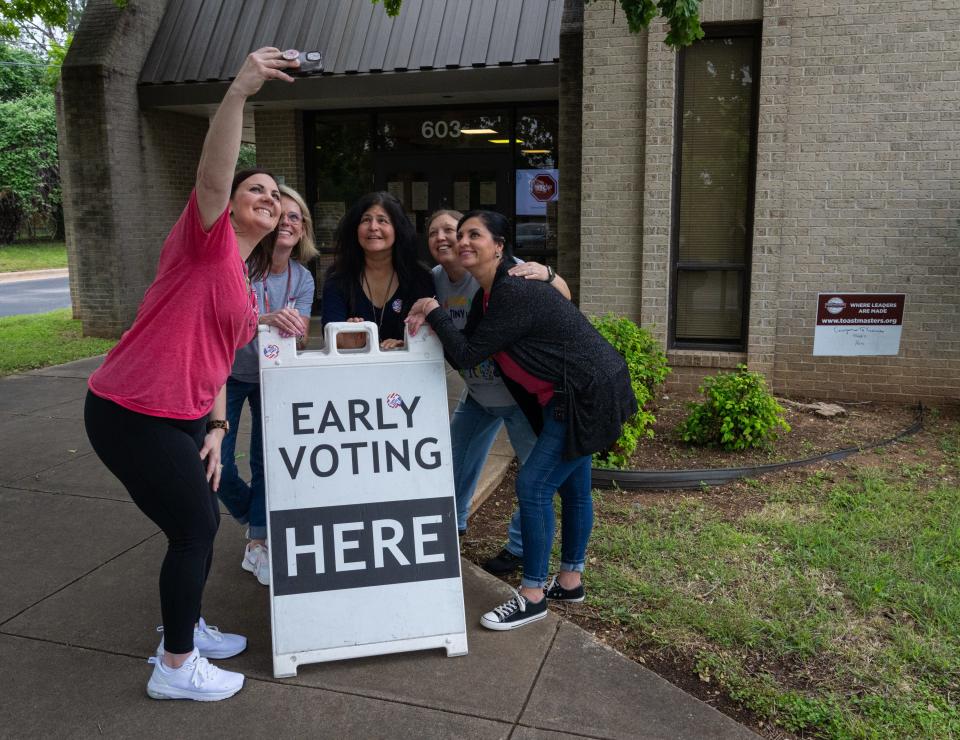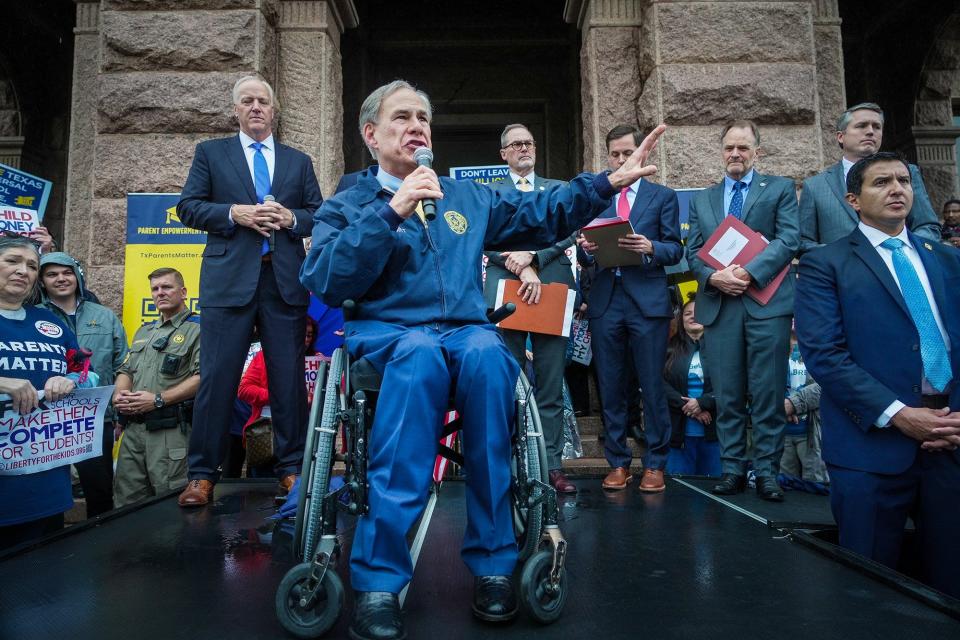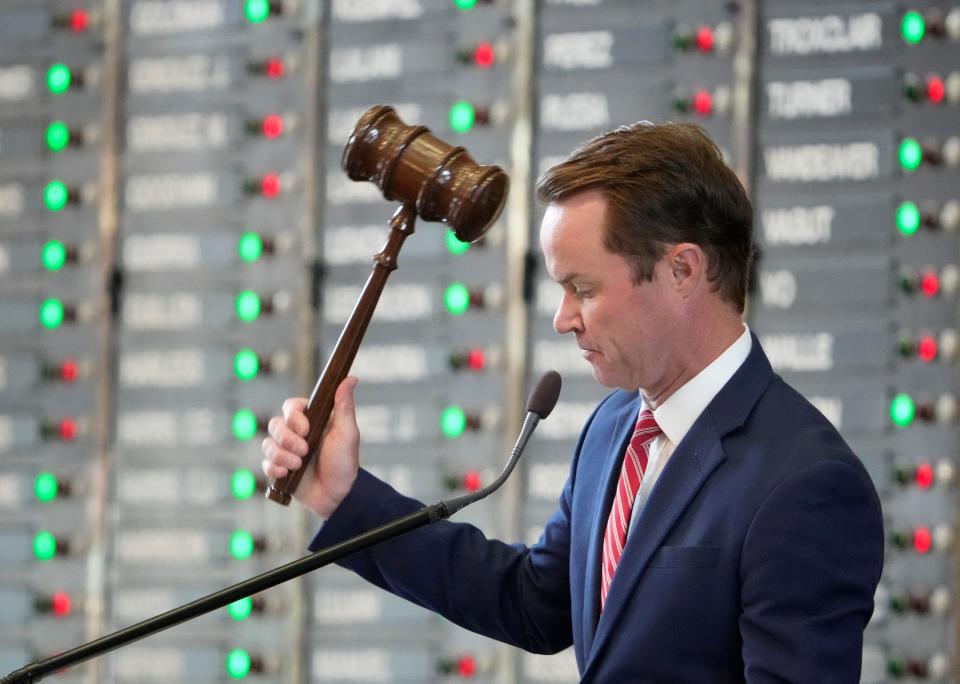Texas primary races will be settled soon. A look at the Democratic, Republican runoffs.
Travis County voters on May 28 will help decide one race in either the Democratic or Republican primary to settle each party's slate of candidates for the November general election.
While most primary races in the county were decided March 5, any contests in which a candidate did not clear a 50% majority will be decided in a runoff election between the top two vote-getters. In Travis County, voters will help decide which GOP candidate will get their party's nomination to represent U.S. Congressional District 35 — a thin sliver that stretches largely along Interstate 35 from East Austin to downtown San Antonio — and which Democratic candidate will have a chance for a judicial seat on the Texas 3rd Court of Appeals.

Early voting in the primary runoffs began Monday and will end Friday. The May 28 election will finally set the Republican and Democratic candidates who will compete in November for several federal, state and local offices, including U.S. president, Texas' U.S. junior senator, district attorneys and several seats in the state Legislature.
Voters who previously cast a ballot in either the Democratic or Republican primary March 5 will have to vote in the same party's runoff. For example, a person who voted in the Republican primary would not be allowed to vote in the Democratic primary runoff but instead would have to cast a GOP ballot.
More: Early voting for Texas' runoff election starts Monday. Here's what else you should know
Here's a look at what voters can expect to see on election day:
Two primary runoff races in Travis County
Hoping to challenge incumbent U.S. Rep. Greg Casar, D-Austin, for the District 35 office in November, Michael Rodriguez and Steven Wright are battling for the Republican nomination.
Casar, a former Austin City Council member, ran unopposed in the Democratic primary. He was first elected to the U.S. House in 2022.
Wright, who previously ran for the seat in 2022 and lost in a Republican runoff, touts border security and immigration as key issues. Wright came in second in the Republican primary in March, slightly behind Rodriguez, who also views immigration reform and border security as marquee issues.

On the Democratic side, voters will decide whether to nominate the incumbent or a challenger for Place 2 on the Texas 3rd Court of Appeals.
Justice Edward Smith, who was first elected to the judicial post in 2018, is being challenged by Maggie Ellis, an administrative law judge, prosecutor and attorney in Central Texas.
Ellis came out ahead of Smith by about 9% of the vote in March.
The winner will face GOP candidate John Messinger, who works in the Office of the State Prosecuting Attorney, in November.
Rerun for the Texas Senate
Molly Cook, who recently won a special election to serve an unexpired term for the District 15 office in the Texas Senate, will again face off against state Rep. Jarvis Johnson for the Houston area seat in the Democratic primary runoff.
Cook on May 4 defeated Jarvis for the unexpired term left vacant by John Whitmire at the end of 2023 after he was elected mayor of Houston. The term ends Dec. 31.
In a rematch May 28, Cook, a Houston emergency room nurse, will again battle it out with Johnson, a business owner, for the Democratic nomination for a full four-year term set to begin when the Legislature convenes in January. Cook and Jarvis were the top two vote-getters in the March 5 primary, with Jarvis holding a substantial lead in the outcome.
More: Border security, property taxes, school choice on tap for Senate's 2025 agenda
Cook previously ran for the Senate seat in 2022, losing the Democratic primary to Whitmire, who had served in that office since 1983.
Johnson, who was first elected to the Texas House in 2016, is a member of the chamber's Appropriations Committee, where he pushed back hard against a $1.5 billion expenditure to construct a border wall during legislative debates last year.
Both candidates have pointed to reproductive rights, health care and public education as top issues in their campaigns.
The winner of the Democratic runoff will face Joseph Trahan, the lone Republican seeking the Senate seat in November.
Texas Gov. Greg Abbott's positive school choice voucher outlook
Gov. Greg Abbott is optimistic about a possible legislative roll call vote on school vouchers next year, as he is supporting and campaigning for Texas House candidates in the Republican primary runoff who are friendly to his signature proposal.
Looking to punish and replace House Republican incumbents who sided with Democrats last year to derail "school choice" legislation, Abbott has put the issue back in front of voters in the weeks leading to election day.
More: Texas lawmakers call for special session on education funding. Why Gov. Abbott is resisting
With eight incumbents feeling the brunt of Abbott's political retribution tour, the leading school choice proponent told conservative radio host Chad Hasty on May 9 that possibly two, and as many as six, of those races could flip to voucher-friendlier hands.
"The probability of school choice passing the Texas House looks almost certain," Abbott said on Hasty's show of the potential outlook after the Republican runoffs.

A school voucher program would use state public education money to help pay for private education tuition. The proposal has been a top focus for Abbott, who spend last year touring the state to help push for the issue. Abbott has also received millions in political contributions, with the largest hauls coming from out of state, to back pro-voucher candidates.
On Tuesday, House Democrats urged Abbott to call a special legislative session to increase public school funding, to which Abbott responded by placing blame on the Democrats for failing to pass his school funding package, which included a voucher program, last year.
More: Texas House agenda prioritizes school choice, border security, property taxes for 2025
None of the Texas House runoff elections is in a district in Travis County or the surrounding area.
Dade Phelan, David Covey conclusion imminent
After months of trading insults with top Republican leaders, a nail-biting cliffhanger during the March 5 primary and nonstop intraparty attacks, the Texas House speaker's political fate will be clearer May 28.
Incumbent Dade Phelan, R-Beaumont, is in the political battle of his life in a runoff election against challenger David Covey, who has backing from Lt. Gov. Dan Patrick and Attorney General Ken Paxton — two powerful Republican officials who are fighting to oust Phelan.
More: Republican infighting, battle over Texas speakership results of national political trend
Paxton continues to hold a grudge against Phelan and his subordinates over an overwhelming House vote to impeach him last year, temporarily removing the state's top lawyer from office, before the Senate, which Patrick runs, acquitted Paxton largely along party lines.
The race for the District 21 state House seat, which represents a stretch of the Gulf Coast, encapsulates all the lingering Republican political frustrations from last year, going back to a failed school voucher push, a strained working relationship with Patrick and Paxton's revenge-driven effort to see Covey elected.

Covey, a former Orange County GOP chairman and oil and gas consultant, has released a constant barrage of condemnations against Phelan, accusing the speaker of being subservient to Democratic lawmakers and chastising him for failing to pass vouchers and allowing the impeachment inquiry into Paxton's conduct.
Phelan, largely brushing off Covey's attacks as politically motivated and untruthful, has stuck to his reputation of having represented the district through several election cycles, running unopposed over the past several, and his work to advance border security legislation and funding last year.
More: Will RFK Jr. qualify for the 2024 Texas ballot? Here's why he's running for president
If Phelan wins the Republican primary runoff, it is far from guaranteed that he would retain his position as the chamber's speaker because an active far-right flank of House Republicans is supporting Rep. Tom Oliverson, R-Cypress, in a bid to take the reins from Phelan.
The GOP candidate who advances from the May 28 election will secure the seat because no Democratic candidate signed up for it.
What's on the ballot in surrounding Central Texas counties?
Bastrop County ballot
Justice, 3rd Court of Appeals District, Place 2 (Democratic runoff)
Edward Smith
Maggie Ellis
County commissioner, Precinct 1 (Republican runoff)
Dominica McGinnis
Butch Carmack
Justice of the peace, Precinct 2, unexpired term (Republican runoff)
Ty McDonald
Zachary Carter
Hays County ballot
U.S. representative, District 35 (Republican runoff)
Michael Rodriguez
Steven Wright
Williamson County ballot
Member, State Board of Education, District 10 (Republican runoff)
Tom Maynard
Mary Bone
U.S. representative, District 31 (Democratic runoff)
Stuart Whitlow
Brian Walbridge
Justice, 3rd Court of Appeals District, Place 2 (Democratic runoff)
Edward Smith
Maggie Ellis
Statesman staff writer Ryan Maxin contributed to this report.
This article originally appeared on Austin American-Statesman: Texas GOP, Democrat primary runoff elections to be settled May 28